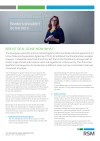As from December 31, 2020, the UK is separated from the EU. This has an impact on the tax and compliance position of EU based companies doing business in the UK and vice versa.
Introduction
While the mile-long lines of trucks have dissipated at ports, companies are waking up to less visible forms of friction at the border between the European Union and the UK that may cause more enduring damage. Time to take a closer look at the possible consequences where it is key to understand is that due to new taxes, needed certificates and additional paperwork, the cost of moving goods and people across the English Channel is rising due to Britain’s exit from the EU. Hereafter we have captured some of the most relevant items in that respect.
Rules of Origin
Post Brexit businesses must show where their goods were made - and where the components in those products come from - to determine whether tariffs are levied on goods into the EU or UK. Those regulations don’t exist for trade within the EU, making the old system far simpler. Confusion about the rules has already prompted complaints from big-name retailers such as Marks & Spencer Group Plc. Others EU businesses have suspended cross border.
VAT
EU business holders and British exporters must register to pay VAT. That is prompting a number of companies to halt their cross-border trade. Key change is that the zero-rated intracommunity supplies with the UK ended due to the fact that the UK is no longer be treated as an EU member state for VAT and customs purposes. The UK will therefore fall back on its own VAT Act.
Customs - Red Tape and Paperwork
In an effort to simplify the forms they must file, some shippers are now refusing to carry loads containing a mix of different products from different companies, this was bound to happen as authorities only issued guidance hours before the end of the transition period and businesses are busy dealing with the pandemic, things will start to fall apart.
Direct taxes
As a result of Brexit, the UK is no longer a qualifying jurisdiction in the context of various EU directives, such as the EU Parent-Subsidiary Directive (exemption of dividend withholding tax and/or capital gains tax) (“EU PSD”) and the EU Interest and Royalty Directive (exemption of interest and royalty withholding tax) (“EU IRD”). However, bilateral tax treaties between EU member states and the UK continue to apply and provide similar beneficial consequences in most cases.
Cross border mergers
Under implementation of the EU Merger Directive, EU member states have implemented legislation which provides for roll-over facilities in respect of cross border mergers between EU companies. If cross border mergers and roll-over relief provisions can no longer be implemented post-Brexit due to the fact that the EU Merger Directive no longer applies, other alternatives should be considered such as the transfer of the seat of an EU company or a liquidation of the EU member state resident company.
Application of EU Court case law
The EU Court of Justice (“CJEU”) has issued a number of important rulings in the past decades with regard to cross border direct taxation. After the end of the transition period the CJEU will no longer have competence in the UK. Therefore, alternatives should be considered in relation to arrangements between EU Member States and the UK to avoid adverse tax consequences.
Income and payrol taxes
An important group of employees on which the Brexit has an impact are the cross-border workers who live in the UK and work in the EU. Many EU member states have already announced that after the transition period current cross border workers from the UK will still be permitted to work in the EU member state in question, provided relevant local requirements have been complied with. UK residents who start working in the EU after the transition period will have to apply for a working permit or a residence permit with work authorization in accordance with the applicable law and requirements of the member state in question.
What to do?
Use our experience and let us help with a post Brexit check, this will cover at least all items above like:
- Correctness of documents in relation to the transport of your goods in the EU
- The correctness of your EU business registration coverage for VAT and Customs
- The outcome applicable tax treaties where relevant
More information?
Should you have any comments or questions, or if you require our assistance with assessing whether your group is compliant with all new rules and applicable legislation, please contact your trusted RSM advisor.
Download 'Doing business in the EU after Brexit' in pdf.

